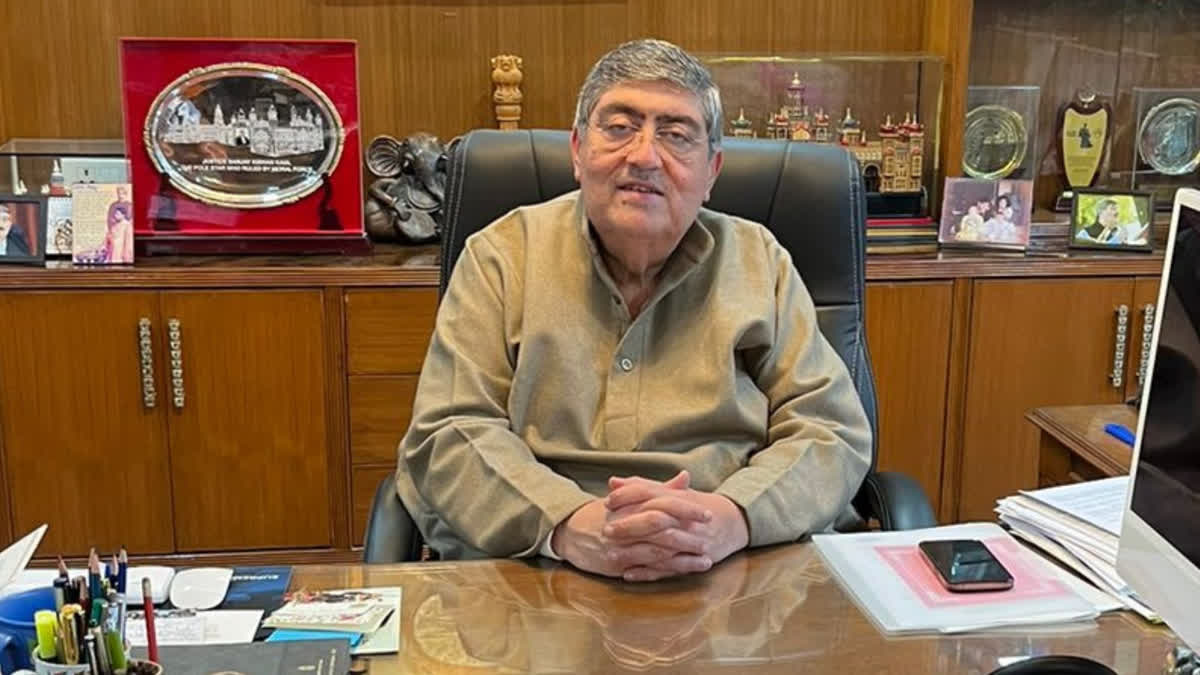New Delhi: Former Supreme Court judge Sanjay Kishan Kaul said in an exclusive interview with ETV Bharat that accepting wrong has happened without a criminal implication will heal the person who has been through it in the context of migration of Kashmiri pandits out of Kashmir.
Justice Kaul said he believes there exists a path of reconciliation and an environment must be created for people to go back to their roots in Kashmir. He stressed that the majority in Kashmir should take certain steps to assimilate the minority. Here are the contents of the exclusive interview in which he threw light on a variety of aspects relating to the vexed issue.
Q: You said you are planning to rebuild your house burnt down in Kashmir, can you elaborate?
A: Personally, we lost two cottages one in the beginning of the problem (during the migration of Kashmiri pandits from Kashmir), apparently some insurgents were hiding there and when the police went there, they set it (the house) on fire. One in 2005, when things were more or less over…. I don’t think it was due to insurgents, the government was willing to acquire it and some local political people who were interested in it and we resisted. I thought the signal was that don’t come back…. We redid the house for the hospitality sector and I stayed in the house after 34 years. Stayed for two weeks in the house. I think over a couple of years a lot of improvement has happened (in Kashmir), realism has dawned that the way forward will be some kind of assimilation and getting over what has happened.
Q: Were you emotional while writing the judgment on Article 370?
A: As a judge you are trained to deal with such issues and it was connected with me, but the legal point was unconnected to my mind in my thinking process. I opened the judgment with my knowledge of history of Kashmir….epilogue was the emotional content, which I wrote. Because I had in mind for a long time, starting from initially the hearing had taken place, a couple of years back, that we must move forward. Like post 1947, people were more aggrieved and things had happened but the civilization moved ahead. Civilization must move ahead otherwise it will be caught in whatever has happened. So, acceptance of what has happened is the healing process. It may not have evidence of 30 years to convict, as they say. But accepting wrong has happened without a criminal implication will heal the person who has been through it.
Q: Do you think there is a path of reconciliation which exists now, after so many years have passed?
A: I do believe so. It is not that people who have left will suddenly come back, that is not going to happen. They have established their lives. I have second generation people, who have established their lives completely elsewhere – it may be abroad or different parts of the country. But they keep expressing their views that they like to go back because your roots are there. We must create an environment, with their roots there (in Kashmir), to at least go back to extent to visit the place where he hails from. If he likes to keep that place for himself to visit it then only the healing process will be complete.
Q: Do you think the majority in Kashmir should take certain steps to assimilate the minority?
A: I believe it should happen. I believe it will happen. There are people of course who will not like peace but 30 years of this process, a new generation has grown some of them had not seen the good times. They have heard of it from their parents and I sense that there is endeavour to get back to what could be a better living together.
Q: In Article 370 judgment, the critics said that the judgment had impinged on federalism and Article 370 was not empty, rather it had certain value. What is your view?
A: Article 370, when it was incorporated had many other aspects by issuance of GOs (government orders) over time it got diluted and everybody accepted it. Now, it had a shell and inside the shell there was something, not a great lot but when the political dispensation decides that a transient provision now has subserved its purpose and it should be brought to an end then it was brought to an end….how it has to be brought to an end was the question, possibly more issues on the process. And, the five judges in their wisdom thought this could be a methodology to bring it to an end and upheld it.
Justice Kaul, who retired earlier this month, was born on December 26, 1958. He obtained his LL.B degree from the Campus Law Centre, Delhi University, in 1982 and enrolled as an advocate with the Bar Council of Delhi on July 15, 1982. In December 1999, he was designated as a senior advocate. In May 2001, Justice Kaul was elevated as an additional judge of the Delhi High Court and he was appointed as a permanent judge on May 2, 2003.
He was elevated as the chief justice of the Punjab and Haryana High Court with effect from June 1, 2013. Justice Kaul was appointed as a judge of the Supreme Court on February 17, 2017. He was part of the top court bench which refused to accord marriage rights to same-sex couples under the existing laws, said the case was not strictly legal but involved social issues, and the government may introduce a law to effectuate such a right to them in future.
Read More



